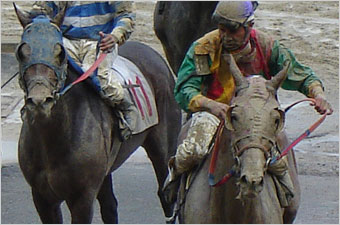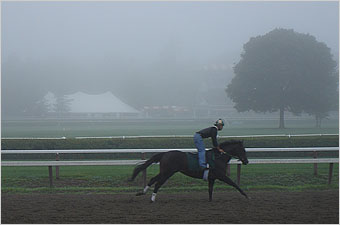Small Change, Big Difference
There’s something different about Santa Anita’s saddle cloths this year:

The numbers are strikingly sharp and legible. Slightly larger than those on most saddle cloths and in a typeface that’s crisp and heavy, the numbers are now much easier to pick out while watching races, even when the field’s running down the backstretch.
Weeks Have Passed
Since I last posted, but I have a great excuse: A new job, at a certain racing publication, for which I and the racing companion must relocate to New York in a few days. So, things have been busy around here, although time was found this weekend for a visit to a muddy, messy Suffolk Downs on Saturday:

And a quick trip to Saratoga, where I watched horses work in the fog Monday morning:

Regular posting will resume, eventually. In the meantime, I highly recommend my fellow TBA bloggers and an exciting new venture from Alan of Left at the Gate: Racing Saratoga.
Paying for Housing
I lived in one of the backstretch dorms at Saratoga last summer, sharing a 9 x 11 room with two other women. We kept our cramped room tidy — there wasn’t enough space for anyone to get messy — but the common areas of the dorm quickly fell into filth. Muddy puddles stagnated in the moldy shower room. Trash overflowed the too small buckets placed in the bathrooms, and the toilets clogged so often that people threw their used tissue into stall corners rather than risk flushing (until the cleaning crew started leaving a plastic bag in the corner, which made the situation slightly more tolerable). The cleaning staff came intermittently — there were times they would come two or three days in a row and then then they wouldn’t come for another three or four days. The women’s dorm was also unsecured, and it wasn’t unusual to step out of the bathroom and find a man lurking in the hall.
Unfortunately, those unclean and unsafe conditions aren’t limited to the Saratoga backstretch. So, that Barbaro’s owner Gretchen Jackson is even bringing the issue up is a good thing — backstretch workers deserve safe, well-maintained housing — but Jackson is very, very wrong about who should be reaching into their wallets to pay for this housing:
“This needs to be brought out, not with the wagging of fingers at people, but more like, ‘Look what’s happening,’ ” Jackson said. “If everybody who went to the track reached in their wallet and spared five dollars instead of placing a bet and put it in for new living quarters for grooms.”
Why should bettors, who already provide for little things like purses by wagering, donate to the cause of better backstretch housing? While I’m sure many would if appealed to, housing really isn’t their concern. Those who most directly benefit from the cheap labor provided by backstretch workers — owners, trainers, and tracks — are the ones who should be reaching into their wallets and sparing some money for decent accommodations. And there should be finger wagging, lots of finger wagging: Racetrack executives should be ashamed of the barely habitable living conditions offered on many backstretches, and trainers and owners should be ashamed that the hotwalkers and grooms who labor seven days a week year round caring for their animals often live worse than those animals.
Jackson, much to her credit, has been using her recent media prominence to speak up about some of the darker issues that haunt racing — not just backstretch conditions, but horse slaughter.
Copyright © 2000-2023 by Jessica Chapel. All rights reserved.